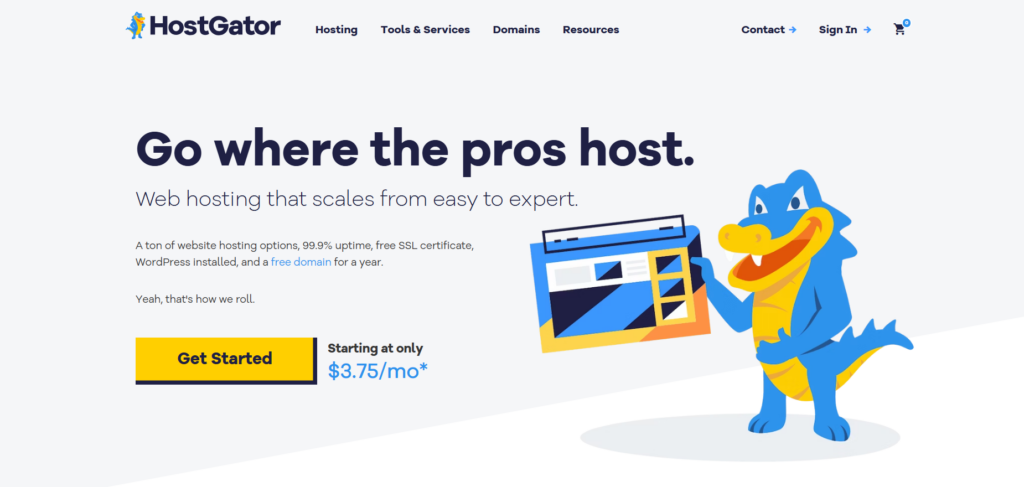Choosing between DreamHost and HostGator can feel like a tough call, especially since both are big names in web hosting. I’ve been in the same spot, trying to figure out which one offers better speed, support, and value for my website.
DreamHost is known for its reliability and WordPress optimization, while HostGator shines with its beginner-friendly tools and affordable plans.
But which one is better for your specific needs—blogging, business, or e-commerce? Let’s break down their features, pricing, and performance to see who comes out on top!
DreamHost
DreamHost is a leading web hosting provider known for its robust, reliable, and feature-rich services. Founded in 1997, it offers shared hosting, managed WordPress hosting, VPS, dedicated servers, and cloud hosting solutions.

DreamHost is highly regarded for its 100% uptime guarantee, generous resources, and user-friendly tools, including a custom control panel.
It supports unlimited bandwidth and storage on many plans, free domain registration, SSL certificates, and automated backups.
DreamHost emphasizes open-source technology and has a strong focus on privacy and security. With 24/7 customer support and a 97-day money-back guarantee, it’s a trusted choice for businesses and individuals alike.
Hostgator
HostGator is a leading web hosting provider known for its affordability, reliability, and user-friendly services. Founded in 2002, it offers various hosting solutions, including shared, VPS, dedicated, cloud, and WordPress hosting.

With features like a 99.9% uptime guarantee, 24/7 customer support, free website migration, and a drag-and-drop website builder, HostGator caters to beginners and advanced users alike.
It includes free SSL certificates and unlimited storage on many plans, ensuring secure and scalable options for businesses and individuals.
HostGator is a trusted choice for launching and managing websites, offering competitive pricing and robust tools to meet diverse web hosting needs.
Key Features Comparison: Dreamhost vs Hostgator
| Feature | DreamHost | HostGator |
|---|---|---|
| Performance | SSD storage, fast load times | Decent performance but slower HDDs |
| Uptime Guarantee | 100% (compensates for downtime) | 99.9% uptime guarantee |
| Pricing | Transparent, lower renewal rates | Higher renewal costs |
| Free Domain | Included with annual plans | Included with annual plans |
| Free SSL Certificate | Included on all plans | Included on all plans |
| Website Builder | WordPress-focused builder | Proprietary builder (Beginner focus) |
| Control Panel | Custom (user-friendly) | cPanel (standard) |
| Customer Support | 24/7, U.S.-based support | 24/7, globally outsourced support |
| Money-Back Guarantee | 97 days (industry-leading) | 45 days |
| Free Backups | Automatic daily backups | Manual or paid backup options |
| Scalability | Seamless upgrade paths | Good but slower to adapt |
| Green Hosting | Carbon-neutral efforts | Limited green initiatives |
| Email Hosting | Paid add-on for shared hosting | Included in plans |
Why DreamHost is Better in terms of Features?
1. Performance and Reliability:
DreamHost uses SSD storage by default for faster website performance, while HostGator often relies on traditional HDDs, which are slower.
DreamHost’s 100% uptime guarantee is superior to HostGator’s 99.9% uptime.
2. Longer Money-Back Guarantee:
DreamHost offers a 97-day money-back guarantee, which is almost double the 45 days offered by HostGator, giving users more time to evaluate the service.
3. Transparent Pricing:
DreamHost’s pricing model is more transparent, with lower renewal rates compared to HostGator’s often higher renewal fees after the first term.
4. Superior Backups:
DreamHost provides free automatic daily backups, whereas HostGator requires either manual backups or an additional cost for automated backup solutions.
5. Eco-Friendly Hosting:
DreamHost actively participates in carbon-neutral and eco-friendly initiatives, making it a better choice for environmentally conscious customers.
6. Custom Control Panel:
While both platforms provide intuitive interfaces, DreamHost’s custom-built control panel is tailored for simplicity, making it particularly appealing for beginners.
7. Customer Support Quality:
DreamHost’s U.S.-based customer support team is consistently rated higher for responsiveness and technical knowledge compared to HostGator’s globally outsourced support.
8. WordPress Optimization:
DreamHost is an officially recommended host by WordPress.org and provides excellent integration for WordPress sites with their custom builder and DreamPress plans.
Pricing Comparison: Dreamhost vs Hostgator
Here’s a Pricing Comparison between DreamHost and HostGator, highlighting key differences for shared hosting, VPS hosting, and WordPress hosting plans.
1. Shared Hosting Pricing Comparison
| Plan | DreamHost | HostGator |
|---|---|---|
| Entry-Level Plan | $2.59/month (Starter Shared Plan) | $2.75/month (Hatchling Plan) |
| Mid-Level Plan | $3.95/month (Unlimited Shared Plan) | $3.50/month (Baby Plan) |
| Renewal Rates | $5.99–$12.99/month (lower) | $6.95–$14.95/month (higher) |
| Free Domain | Included with annual plans | Included with annual plans |
| Free SSL | Included | Included |
| Email Hosting | $1.67/month (Starter plan only) | Included |
2. WordPress Hosting Pricing Comparison
| Plan | DreamHost | HostGator |
|---|---|---|
| Entry-Level Plan | $2.59/month (Shared Starter) | $5.95/month (Starter Plan) |
| Mid-Level Plan | $16.95/month (DreamPress) | $7.95/month (Standard Plan) |
| High-Tier Plan | $71.95/month (DreamPress Pro) | $9.95/month (Business Plan) |
| WordPress Features | Optimized, official recommendation | Decent, no WordPress endorsement |
| Renewal Rates | Transparent, lower than HostGator | Higher after the first term |
3. VPS Hosting Pricing Comparison
| Plan | DreamHost | HostGator |
|---|---|---|
| Entry-Level Plan | $10/month | $23.95/month |
| Mid-Level Plan | $20/month | $34.95/month |
| High-Tier Plan | $80/month | $59.95/month |
| Managed Services | Yes (fully managed) | Yes |
| Renewal Rates | Same as initial price (no increase) | Increases after the initial term |
Pricing Summary
DreamHost’s Advantages:
- DreamHost has consistently lower starting prices for shared hosting and WordPress hosting.
- Renewal rates for DreamHost are more transparent and affordable, while HostGator’s renewal rates can be significantly higher.
- For VPS hosting, DreamHost offers better value with lower prices across all tiers.
- DreamHost does not oversell hosting resources, which is sometimes a complaint with HostGator.
HostGator’s Advantages:
- Slightly cheaper introductory pricing for mid-tier shared hosting plans.
- Free email hosting on all plans, whereas DreamHost charges for email with the Starter Shared plan.
Conclusion:
While HostGator may offer slightly cheaper pricing on some shared hosting plans, DreamHost provides better value overall due to its lower renewal rates, transparent pricing, and a broader range of high-performance plans at competitive prices. DreamHost is especially advantageous for users seeking long-term hosting solutions.
The Final Vredict
DreamHost and HostGator are popular hosting providers, but DreamHost has the edge. It offers a superior 97-day money-back guarantee compared to HostGator’s 45 days, demonstrating confidence in its services.
DreamHost provides unlimited bandwidth and storage across plans, with no hidden fees. Its intuitive control panel and free automated WordPress migrations outshine HostGator’s clunky cPanel.
DreamHost also emphasizes privacy, including free domain privacy protection, and is eco-friendly. With better uptime reliability and transparency, DreamHost is the smarter, more sustainable hosting choice.
FAQ’s
Which host offers better uptime?
DreamHost guarantees 100% uptime, while HostGator offers 99.9%.
Which is cheaper in the long run?
DreamHost has lower and more transparent renewal rates.
Which is better for WordPress hosting?
DreamHost is officially recommended by WordPress.org.
Who has the better refund policy?
DreamHost offers a 97-day money-back guarantee compared to HostGator’s 45 days.
Which has faster performance?
DreamHost uses SSDs for faster load times, while HostGator often relies on HDDs.


